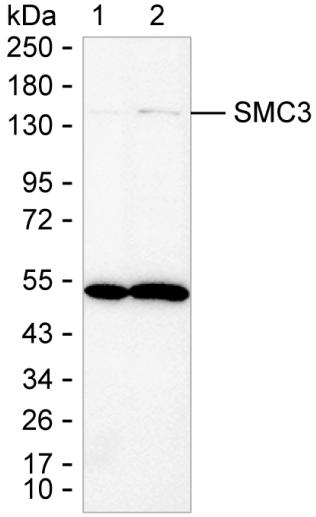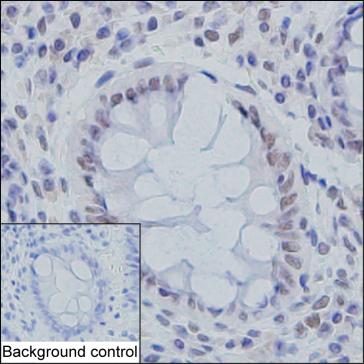Smc3 (13R9) Rat Monoclonal Antibody
Smc3 (13R9) Rat Monoclonal Antibody
- SPECIFICATION
- CITATIONS
- PROTOCOLS
- BACKGROUND

Application
| WB, IHC |
|---|---|
| Primary Accession | Q9CW03 |
| Reactivity | Mouse |
| Clonality | Monoclonal |
| Calculated MW | 141556 Da |
| Gene ID | 13006 |
|---|---|
| Other Names | Structural maintenance of chromosomes protein 3, SMC protein 3, SMC-3, Basement membrane-associated chondroitin proteoglycan, Bamacan, Chondroitin sulfate proteoglycan 6, Chromosome segregation protein SmcD, Mad member-interacting protein 1, Smc3, Bam, Bmh, Cspg6, Mmip1, Smc3l1, Smcd |
| Dilution | WB~~1:1000 IHC~~1:100~500 |
| Storage Conditions | -20℃ |
| Name | Smc3 |
|---|---|
| Synonyms | Bam, Bmh, Cspg6, Mmip1, Smc3l1, Smcd |
| Function | Central component of cohesin, a complex required for chromosome cohesion during the cell cycle. The cohesin complex may form a large proteinaceous ring within which sister chromatids can be trapped. At anaphase, the complex is cleaved and dissociates from chromatin, allowing sister chromatids to segregate. Cohesion is coupled to DNA replication and is involved in DNA repair. The cohesin complex also plays an important role in spindle pole assembly during mitosis and in chromosomes movement. |
| Cellular Location | Nucleus. Chromosome. Chromosome, centromere. Note=Associates with chromatin. Before prophase it is scattered along chromosome arms During prophase, most of cohesin complexes dissociate from chromatin probably because of phosphorylation by PLK, except at centromeres, where cohesin complexes remain. At anaphase, the RAD21 subunit of the cohesin complex is cleaved, leading to the dissociation of the complex from chromosomes, allowing chromosome separation. The phosphorylated form at Ser-1083 is preferentially associated with unsynapsed chromosomal regions |
| Tissue Location | Spermatocytes (at protein level). Widely expressed, with higher expression in testis and brain |

Thousands of laboratories across the world have published research that depended on the performance of antibodies from Abcepta to advance their research. Check out links to articles that cite our products in major peer-reviewed journals, organized by research category.
info@abcepta.com, and receive a free "I Love Antibodies" mug.
Provided below are standard protocols that you may find useful for product applications.
If you have used an Abcepta product and would like to share how it has performed, please click on the "Submit Review" button and provide the requested information. Our staff will examine and post your review and contact you if needed.
If you have any additional inquiries please email technical services at tech@abcepta.com.













 Foundational characteristics of cancer include proliferation, angiogenesis, migration, evasion of apoptosis, and cellular immortality. Find key markers for these cellular processes and antibodies to detect them.
Foundational characteristics of cancer include proliferation, angiogenesis, migration, evasion of apoptosis, and cellular immortality. Find key markers for these cellular processes and antibodies to detect them. The SUMOplot™ Analysis Program predicts and scores sumoylation sites in your protein. SUMOylation is a post-translational modification involved in various cellular processes, such as nuclear-cytosolic transport, transcriptional regulation, apoptosis, protein stability, response to stress, and progression through the cell cycle.
The SUMOplot™ Analysis Program predicts and scores sumoylation sites in your protein. SUMOylation is a post-translational modification involved in various cellular processes, such as nuclear-cytosolic transport, transcriptional regulation, apoptosis, protein stability, response to stress, and progression through the cell cycle. The Autophagy Receptor Motif Plotter predicts and scores autophagy receptor binding sites in your protein. Identifying proteins connected to this pathway is critical to understanding the role of autophagy in physiological as well as pathological processes such as development, differentiation, neurodegenerative diseases, stress, infection, and cancer.
The Autophagy Receptor Motif Plotter predicts and scores autophagy receptor binding sites in your protein. Identifying proteins connected to this pathway is critical to understanding the role of autophagy in physiological as well as pathological processes such as development, differentiation, neurodegenerative diseases, stress, infection, and cancer.



